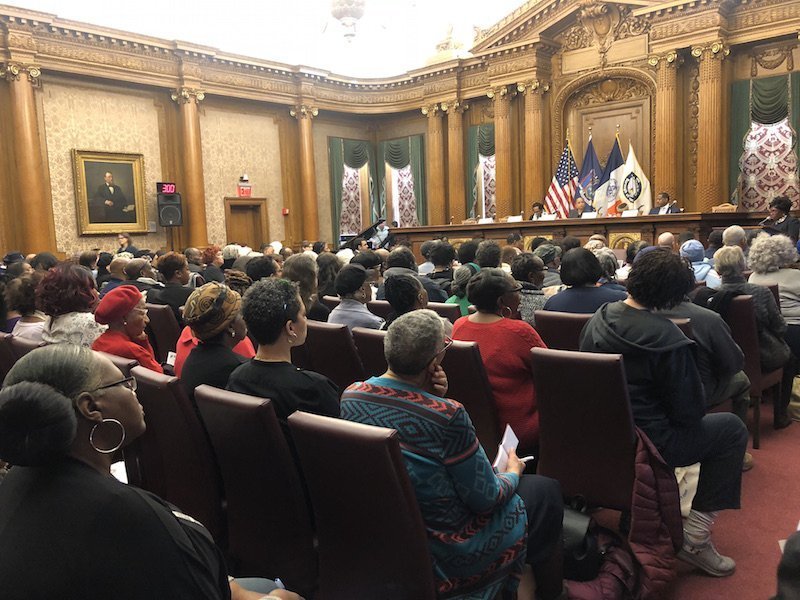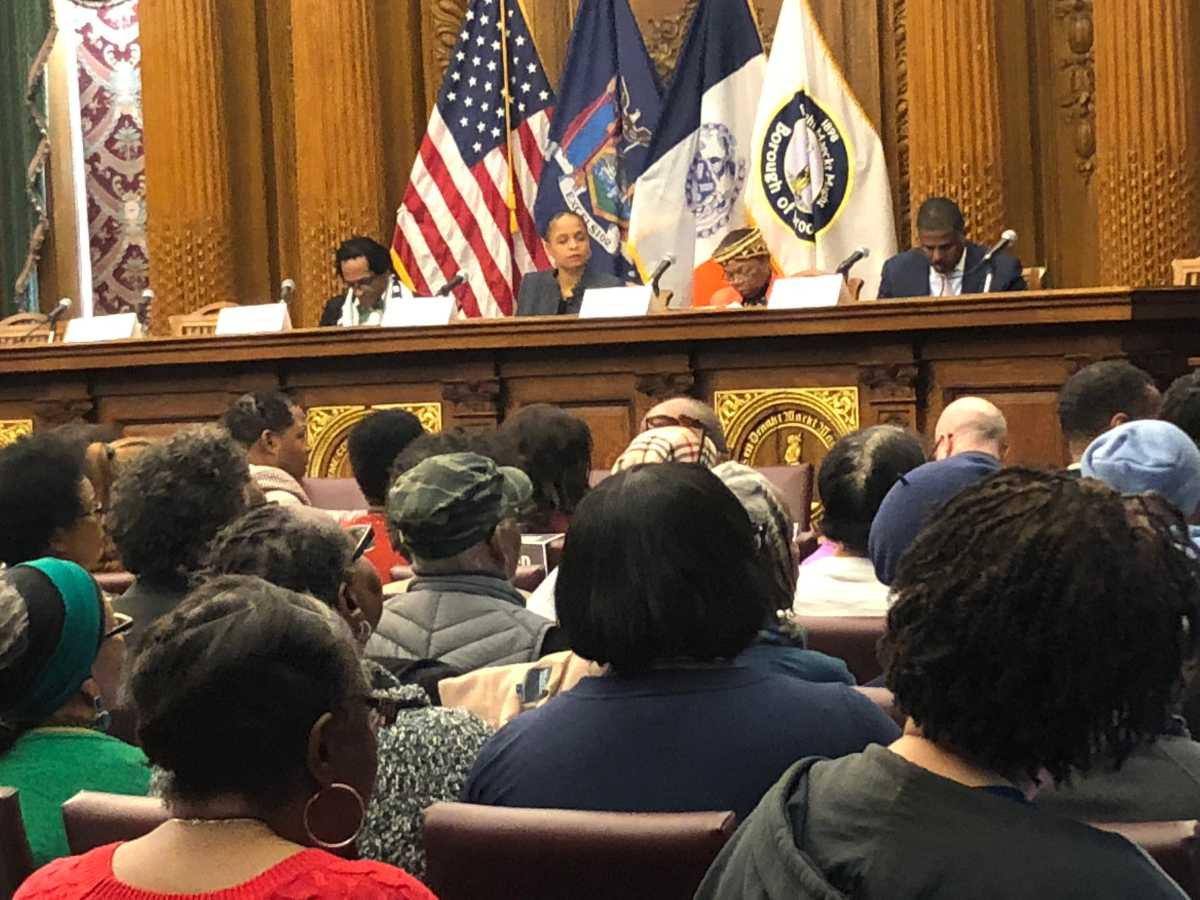Editor’s Note: This continues a KCP investigative series by reporters Kelly Mena and Stephen Witt on how New York City is taking paid off properties from longtime small property owners, including black and brown seniors, and giving them to connected non-profit and for-profit developers as gentrification continues to sweep across Brooklyn.
Dozens of majority Black and Latino property owners packed two full rooms at Brooklyn Borough Hall last Friday as attendee after attendee told their story of how the City took their property from right under them.
At the helm of the three-hour long legislative hearing was Brooklyn Borough President Eric L. Adams joined by State Senators Velmanette Montgomery, Kevin Parker and Brian Kavanagh, Chair of the State Senate Housing Committee and Assemblymembers Tremaine Wright and Nick Perry, who looked to Brooklyn residents for the next course of action against the Third Party Transfer Program (TPT) under the Department of Housing Preservation and Development (HPD).
Last October, city and state officials called on both the New York State Unified Court System and the De Blasio Administration to put a moratorium on and investigate the seizing of properties through the TPT Program.
“We did a letter and I think about 20 of us elected officials signed on asking for a moratorium on the TPT Program specifically. We wrote to the Mayor and all of the leaders and everyone we could think of but we got no response. So clearly asking for a moratorium did not work, so we are wondering if we need to do something more than that and what would that be?” Montgomery posed to the attendees.
The lawmakers represent the neighborhoods most hard hit and arguably disproportionately affected by the most recent round of seizures through the TPT Program including Bedford-Stuyvesant, Crown Heights and other parts of Central Brooklyn.

In Dec 2017, over 60 properties were bundled before Kings County Supreme Court Judge Mark Partnow who made a foreclosure judgement on them for the same date.
The TPT program itself aims to sustain affordable housing and prevent tenants from living in deplorable living situations by taking over so-called “distressed properties.”
However, under the program, the city gives ownership to properties behind on property taxes, water bills and in some cases building violations to favored non- and for-profit developers for $1 plus $8,750 per unit minus the supers unit.
The chosen developers are not responsible for any of the back property taxes or water or sewer money owed and the city puts a freeze on any property taxes. The city also gives the developers very low (1%) and in some cases no percent financing to redevelop the properties. The developers take 10 percent of this financing for their development fee.
At the same time, the former owners, many of which have owned the property free and clear, lose all their equity in the property, which because of gentrification is often in excess of $1 million. Longtime tenants are displaced, and after the non-profits finish redeveloping the properties they sell them back to the tenants for $2,500 per unit as co-ops.
However, these low-income tenants are now responsible for property taxes, and water and sewer fees again. They are also responsible to pay back the financing the chosen developers obtained through the city, including their 10 percent development fee.
Though the hearing was meant to look at the overall homeownership crisis facing the borough including deed theft and deed fraud, the majority of testimony given was focused on the TPT Program. Several speakers alleged the city and HPD through the TPT program are operating like an organized crime syndicate to the nods and clapping of audience participants.
Sherlivia Thomas-Murchinson, currently homeless with two children, is one of three lead plaintiffs in a civil lawsuit against the city for the seizure of the properties.
Last week, Brooklyn property owners filed papers in the U.S. Southern District of New York Federal District Court this week seeking certification to pursue a class action lawsuit, which if successful, could cost the city tens of millions of dollars and the return of dozens of property unconstitutionally confiscated
“We have definitely been cheated and targeted through this program. My family has lost real estate property, personal property and personal earning assets that exceeds over $2 million dollars,” claimed Thomas-Murchinson.
Though the hearing led to an outpouring of personal horror stories and loss of generational wealth across families, Montgomery was quick to point out that they were looking for legislative direction and policy recommendations on how to properly deal with the program
“To be clear, we are really trying to get some direction. This is not for us to just hear the stories we want to talk about solutions today. That is the purpose of this meeting ,” said Montgomery.
Also present was Assemblyman Al Taylor (D-Harlem) who has been closely following the TPT Program in Brooklyn as his 71st Assembly District is also facing issues with homeownership loss.
Noticeably absent at the hearing was City Council members Robert Cornegy (D-Bedford-Stuyvesant, Northern Crown Heights) and Antonio Reynoso (D-Williamsburg, Bushwick).
Reynoso, who has been silent on the issue, and has yet to return many calls and emails from KCP, in particular has much to answer for as his office was directly involved in at least two HFDC properties under the guise of “helping tenants.”
One of these properties involves shareholders at 19 Kingsland Avenue, whose story KCP has chronicled and who are currently fighting for their deed back in court.
At the hearing, a similar story was heard, when Lori Kelley, the secretary of the 111 Linden Street HDFC in Bushwick, accounted how the low-income co-op building reached out to Reynoso, who assigned Boris Santos from his office to look into the situation.
“He came to our building and even looked at all of the repairs that we made and he was very impressed. He told us that he was on board and would help us get off the TPT list. We agreed to fill out the article XI (a temproary property tax exemption) resolution We filled it out and hand delivered it to HPD only to never get a response from them and still remained on the TPT list,” recalled Kelley.
“We later found out that the Artivle XI packet was left on an employee’s desk that retired and nothing was done with it. We could not make and agreement for water because they wanted a huge amount to even enter into a payment agreement and without that we couldn’t get an agreement for taxes. We ultimately received an email from Boris Santos stating that they would not help us.”
Kelley also said that the favored non-profit, RiseBoro, which took over ownership of the property in September 2018, has yet to do any repairs.
“We have a leak in our basement from the boiler that began about 2 ½ months ago that RiseBoro caused and still has not repaired, it is ruining the basement. The repair people that they send out are not licensed they are just repair people. Our boiler runs on manual which means we ourselves have to turn it on and off. Every 21-25 days we are out of oil so we have no heat or hot water. If we do not inform them we need oil they would never know. I have called our property manager on several occasions and no one has called us back,” Kelley said.






